The Butterfly Effect
 for violence, sexual content, language and brief drug use.
for violence, sexual content, language and brief drug use.
Reviewed by: Brett Willis
STAFF WRITER
| Moral Rating: | Extremely Offensive |
| Moviemaking Quality: |
|
| Primary Audience: | Adults |
| Genre: | Sci-Fi Thriller |
| Length: | 1 hr. 53 min. |
| Year of Release: | 2004 |
| USA Release: |
January 23, 2004 |
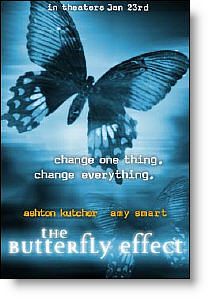
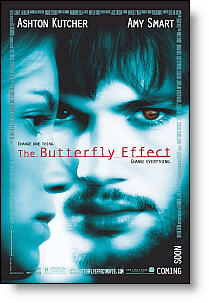
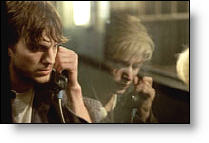
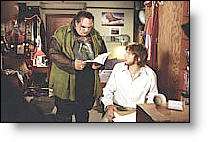
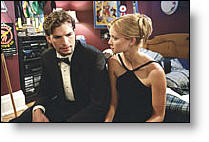
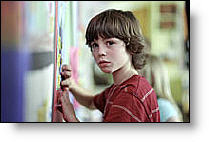

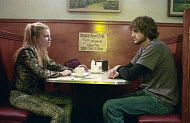
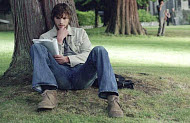
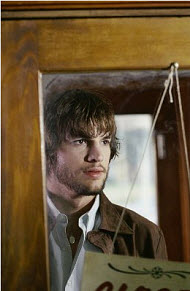
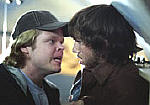
How can I be and feel forgiven? Answer
If God forgives me every time I ask, why do I still feel so guilty? Answer
Why is the world the way it is? Answer
| Featuring |
|---|
|
Ashton Kutcher Amy Smart Eldon Henson William Lee Scott Eric Stoltz Melora Walters Ethan Suplee |
| Director |
|
Eric Bress J. Mackye Gruber |
| Producer |
| J.C. Spink, Chris Bender, A.J. Dix, Anthony Rhulen |
| Distributor |
“Such minor changes, such huge consequences.”
All of us have wished for the chance to be able go back in time and change certain actions, in order to undo the negative effects . But it’s important never to cross over into imagining that we actually CAN alter the past. God’s forgiveness will undo some of the negative effects; but the actions themselves, and some of their consequences, are irreversible. Some people, by over-fantasizing about changing things, have committed some missteps at their high school reunions etc. and have made things worse instead of better.
Of course, that’s the REAL world. In the REEL world, “The Butterfly Effect” plays directly to our fantasies about changing the past. It involves “alternate universes,” but without time-travel in the classic sense. Its method of branching into an alternate universe is one part “Somewhere in Time,” one part “Frequency,” and one part original approach.
The central character, Evan Treborn (Ashton Kutcher), suffered repression blackouts as a child. Now, at age 20, he hasn’t had any blackouts for seven years, and he summons up the courage to revisit the events that he’s always shielded himself from. But while reading a page from one of his personal journals written during a “blackout day,” he discovers that he has the special ability to transport his consciousness back to that time, and change his actions.
Once that’s done, his consciousness immediately reverts to the present day, but with his own life and everything around him altered on the basis of the changed actions. And since he still has his “old” set of memories in addition to a new, implanted set, his brain matter swells from the overload and he bleeds from the nose. If he makes too many of these trips back, he’s liable to die of a stroke.
Evan and his friends Lenny Kagan, Kayleigh Miller, and Kayleigh’s brother Tommy, along with Evan’s mom Andrea (Melora Walters), are the main characters. One set of actors (Kutcher plus Elden Henson, Amy Smart and William Lee Scott) plays the four friends in the present day, at age 20 or so; another set plays them at age 13; and still another set plays all of them except Lenny at age 7. The physical resemblance and consistent mannerisms from one set of actors to another is good enough that we have no doubt who’s who as we move forward in time. Also, the adult actors are required to take on multiple character roles in the alternate universes: In each permutation of reality, they’re still the same people, but are radically altered by their circumstances. A frat girl becomes a hooker; a murderer becomes a born-again Christian.
Many films fail to make their characters three-dimensional; this one goes far beyond three dimensions. And the child actors as well as the adults are emotional and convincing in their roles.
Evan begins to alter the past with the instinctive goal of making himself, his three friends and his mom all happy and well-adjusted people. But, as you might expect, each change has unintended consequences. In every alternate universe, some of the main characters are better off but others are worse. Evan finally goes even farther back in time than he intended, in a sacrificial act intended to wipe out ALL the negative events. That’s as close to a positive element as this film ever gets.
Before I go any further, a warning: This is an extremely upsetting film, containing material seldom seen in mainstream cinema. I’m a very hardened filmgoer, but this one was tough to endure even for me. If you’re sensitive to vulgar, offensive or blasphemous material, you may want to skip not only this film but the rest of this review as well. For those still interested, read on. This review is provided as a service. But I absolutely don’t recommend this film to anyone.
After an introductory present-day teaser, here’s what the filmgoer sees in the first half hour or so. At age seven, Evan begins to have blackouts. In school, he draws a picture of what he wants to be when he grows up. The picture shows him standing with a knife over two men that he’s wounded or killed. But after the drawing is done, he doesn’t remember having made it. (Thanks to the swastika tattooed on the arm of one of the men, and to the context in which the adult Evan went back and changed this bit of history later, I finally figured out the meaning of the drawing a couple of hours after the film was finished.)
Later, Evan gets a kitchen knife and holds it in what seems a threatening manner. When confronted by his mom, he can’t explain this incident either. Evan spends a day with Kayleigh and Tommy. Since his own father is in a mental institution, Evan is anxious to see what a family with a real dad is like. Well, Mr. Miller (Eric Stoltz) isn’t a “real dad.” Although Evan has another blackout, it’s obvious that Mr. Miller makes a child porn film using Evan and Kayleigh. When Evan goes to the hospital to meet his own dad (Callum Keith Rennie) for the first time in his life, he has another blackout and wakes up to find his dad trying to choke him to death. The elder Treborn persists until one of the hospital personnel bashes him over the head, killing him.
Fast-forward to age thirteen. The four friends are cigarette-smoking, sex-verb-spouting brats. Mr. Miller still abuses both Kayleigh (who has bruise marks) and Tommy. Tommy, the most sadistic of the lot, goads the relatively mild-mannered Lenny into placing a stick of dynamite (which Mr. Miller had hidden away for some obscure purpose) into a mailbox. And Evan provides a cigarette as a time-delay fuse. Evan has another blackout, so we don’t see the explosion; but obviously something very bad has happened (we learn later that a woman went to the mailbox with an infant in her arms). Lenny, who apparently has asthma, hyperventilates. The kids get away, but they carry the guilt around (except for Evan, who doesn’t remember what happened).
The kids go to a movie theater by themselves, and obviously pay for a show like “Dumb and Dumber,” but sneak into “Se7en” instead. Tommy loves the film; but it creeps out Kayleigh, who is comforted by Evan. As Evan and Kayleigh begin to display romantic feelings for each other, Tommy becomes insanely jealous. He ties up Evan’s dog in a gunnysack, douses him with lighter fluid and prepares to burn him. When Evan tries to interfere, Tommy swings at Evan with a log, first hitting Kayleigh in the face by mistake and then hitting and kicking Evan. Lenny is paralyzed with fear and unable to stand up to Tommy, who proceeds to torch the dog.
Evan’s mom finally moves away from the neighborhood, to give him a new start. He promises he’ll come back for Kayleigh someday. Those are the high points of Act One.
Now at age 20, Evan is in college, a psychology major, doing well. If living a hedonistic lifestyle and having a six-three, 300-pound-plus, sex-crazed, drug-using Goth roommate can be considered doing well. But (not surprisingly) Evan’s three childhood friends are still all messed up. As mentioned before, Evan discovers that he has the power to change the past, and he proceeds to do so; but nothing works out the way he intends. The alternate worlds he creates take us to some very disgusting landscapes.
There’s one alternative where Kayleigh is a scarred, wasted, druggie hooker. Another one where Evan commits murder and gets sent to prison where he needs to join the Aryan Brotherhood for his own protection against the black inmates, but won’t be allowed to join unless he gives oral or anal sex to the Brotherhood leaders. And other alternatives where major characters are physically or mentally incapacitated in various ways and are in some cases driven to attempt suicide. Words fail me to describe the sum total effect of all these dark images.
Violence: Several murders including the violent (offscreen) death of an infant. Ferocious hand-to-hand fighting, including by the child actors. Suicide. Scarring and dismemberment. Killing of a pet dog (simulated). Threats and posturing. Mistreatment of fraternity pledges by the frat brothers administering the initiation.
Language: Over 50 occurrences of f*, many of them spoken by the child actors. About 70 other curses, profanities and vulgarities. Racial slurs, especially in the prison sequence.
Sex/Nudity: The most uncomfortable scene, in my opinion, is where seven-year-old Evan recovers from his blackout and he and Kayleigh are standing next to each other, with confused expressions, not wearing their clothes but holding them up in front of themselves (seen in upper body view only). Eric Stoltz has such a sweet on-screen persona that it’s always hard for me to take him seriously in a villain role, much less that of someone who’d do this to his own daughter. But perhaps the directors are making a point that no matter how innocent someone acts, you don’t know what they really are (which is true).
There are several scenes of simulated or implied sex, mostly in the college sequences, some with movement and/or breast nudity visible. In one alternate world, Evan is in a girls’ dorm with his girlfriend, and walks to the bathroom down the hall, while several girls in various states of undress casually show themselves off to him and one girl comes out of the shower displaying full frontal nudity.
Blasphemous content: In the prison sequence, Evan’s cellmate is a tough, tattooed dude and also a Bible-believer (although he comments something to the effect that Jesus Himself couldn’t supply him the power to stand up to the Aryans). To get his cellmate’s help with something, Evan claims that Jesus talks to him in dreams. When the cellmate doesn’t buy his story, Evan projects himself back to his first grade classroom, and stabs his hands on two paper-spindles. The result in the present is that scars from those wounds (which the cellmate regards as “Stigmata”) suddenly appear on Evan’s hands.
In one alternative world, both Evan and Tommy try to stop the mother and her baby from being killed by the mailbox bomb. The adult Kayleigh explains that Tommy became a “Jesus Freak” as a result of that day. That may just be Kayleigh’s take on the situation, but it’s the only one the theater audience is given. So, what’s wrong with that? A person doesn’t become born again by doing good works, but by CEASING to trust in his own works and trusting Jesus alone.
Learn more about Jesus Christ
And of course, the very idea of alternate universes is blasphemous.
One more thing: There are plot holes. Big ones. If we accept the premise of the story, it should be a no-brainer that if Evan projects back to age seven and changes something, and then from the resulting alternate world projects back to age thirteen and changes something else, that in the second alternate world the change made at age seven (and its results) should STAY CHANGED. But that’s not the case. Also, we eventually figure out that some of Evan’s blackouts in the “original universe” were the result of him projecting himself back from “later universes.” So these parallel worlds are influencing each other in an incomprehensible, nonlinear fashion.
Bottom line: There’s a great deal of objectionable material that I HAVEN’T detailed. Partly so as not to give away the storyline for those of you who insist on seeing this film, and partly because there’s simply no room to tell it all. My assessment is, if you’re a serious Christian or just an ordinary decent person of any stripe, and you see this film, you’ll regret having done so. I do.
Violence: Extreme | Profanity: Extreme | Sex/Nudity: Heavy
See list of Relevant Issues—questions-and-answers.


Whoever says there are major plot holes obviously wasn’t paying attention because so many incidents take place in the movie, what with all the switching from one alternate universe to another, it’s easy to get lost in the plot. I saw this movie three times before I really got the plot.
As for the “objectionable” content, things like that are out there and really do happen and I think this movie accurately displays the devastating effects molestation could have on a person’s life. I thought the ending was beautiful because it showed an example of giving, unselfish love (i.e. Evan’s willingness to sacrifice ever even knowing Kayleigh for her happiness). I thought this movie had a good plot and was well written, but only recommend it to mature people who can handle it.
[Average/5]
Sure there’s offensive content, but there’s also positive content that should not be left out. Besides all that stuff, the movie is superbly well-made, carried by a genius concept, fast-paced storytelling, powerful emotions, a great score, good performances (especially from Amy Smart), and the bleak coloring.
It all made for a fantastic movie and thoroughly enjoyable and fulfilling watch. I recommend this film for mature people who can the handle the content and appreciate the brilliance of the premise.
Moral rating: Very Offensive / Moviemaking quality: 4½
[Excellent!/4]
If you think about it, everytime Evan went back to those blackouts, he had a choice. He could either do something good, or something bad. And so often, every-day in fact, we are given choices to make. And each choice has its own set of consequences that go with it.
Ultimately, God has a purpose and a destiny set out for us. He knows what’s going to happen and what our future holds. But we still have free will and we still have choices. We can decide to either take the easy way, or the hard way. So give this movie a chance.
It maybe heavy on non-christian things, but like one of the other reviewers says, its portrayed in a negative sense. I wouldn’t recommend it to families, that’s for sure, but I’m sure some Pastors, Youth Pastors and Leaders, and other well spoken Christians could find something in it to teach on.
[Very Offensive/4]
[Average/5]
I do not feel this is a movie for children or anyone under the age of consent, this movie is more for Christians with a healthy spiritual life than anything else. its important we understand as Christians that the movies we watch are to be put in perspective, and understand that its Jesus who saves us not our works, though when it comes down to it the movies depiction of actions and their consequences although dire at times, was excellent.
The protagonist’s dilemma although in the context of time travel is unique, in real life is not so different from the choices we face. The idea of ends justifying the means, was to me shown in a negative light, and its the choices we make today that will affect the person we will be. The point of all this is as Christians and as a non-Christian we will all face a defining moment in our lives that will affect the course of our destinies. The choice we all face? Submitting out lives to Christ.
[Average/4]
Later in life he finds out that he can go back and change the past, so he can try and make the future better. The film’s story was very well written. The actors do a pretty good job as well, including Ashton Kutcher, who most people are pretty sceptical about due to his niche in Comedy. He does a much better job than I thought he would.
I will say that this movie has some very dark substance. About as dark as “Fight Club”. There really isn’t much Godly substance in the movie. I wouldn’t recommend letting your child see it. and I wouldn’t recommend seeing it unless you are a very strong Christian, whose not susceptible to the dark substance that’s all through the film.
The real reason that I gave this movie 4 out of 5 is that my father is a writer and the storytelling in this movie is very well done, and the character development is excellent, something that I can appreciate.
[Very Offensive/4]
However, the sensitive issues that Evan has dealt with as a child include child abuse, murder and watching his animal being burnt are quite disturbing to watch. The general mood of the movie is quite somber and almost depressing, but I still find the concept of the movie very interesting.
[Very Offensive/4]
[Extremely Offensive/1]
[Very Offensive/4]
[Good/3]
[Extremely Offensive/1]
After seeing the sacreligious paraphernalia in the jail cell scene, my friends and I walked out—that was enough. Never again will I subject myself to such a horrible film. Sure, the plot was interesting, but many things could have been left out as they were completely unnecessary.
The thing that bothered me the most, was the fact that this film was rated 14 A!!! So any 14 year old could walk in there and see violence, pre-marital sex, drug abuse, alcoholism, child porn, and swearing all in the course of 2 hours. Honestly… what is this world coming too???
[Extremely Offensive/3]
[Better than Average/4]
[Extremely Offensive/1½]
The different timelines do keep you guessing, but only for a little-bit. While the movie wasn’t filled with as much sex and nudity as I had imagined… it has 2 scenes of nudity and one short, but slightly graphic sex scene.
The language is a bit harsh… especially when a “Bible believing Christian” uses the f-word along with other colorful metaphors.
From a Christian point of view, this is an extremely offensive movie with just about everything that is offensive in Hollywood movies wrapped up in this ugly package. The only thing positive about this movie is Ashton Kutcher’s strong performance as the confused and scared main character. Amy Smart and the only performances are just average. I do not recommend this preposterous movie to anyone! Especially Christians. From what I heard… nobody walking out of the theater was pleased with what they saw!
[Extremely Offensive/3]
[Very Offensive/4½]
It reminded me of how so much our world needs Jesus. People sin so lightly that they don’t even know that they’re sinning anymore. Lastly, one of the most hurting things I saw (well saw/heard) was the disgust in the voice of one of the characters when the mentioned Jesus. This movie isn’t one you should watch, any age, any maturity at all. I know many people who say these kinds of movies don’t affect them. Its not true.
[Extremely Offensive/2½]
I also think it would be really hard to be a guy sitting through a movie like this with such sexual references, and involvement while trying to stay pure and not lust… but it is quite a bit easier for girls.
I think that it really would have been an excellent movie, if the makers had not ruined it with such content. However, I also think that the storyline and development of the characters was great! It was very suspenseful and kept you on the edge of your seat for its entirety.
I also found it to be a very emotional movie. I went from laughing to crying, and it was just really thought provoking. My friend and I left the movie theater and didn’t know what to say, because the movie was so weird and brought up so many “what if’s.”
I would not suggest this movie to guys, well, at least guys having problems with lust, and I wouldn’t suggest it as a type of movie that you would want to go to with a date, because it would be very awkward. But I think that until they come up with a movie that has a plot like this, just without the bad stuff, this movies is good for spiritually stable people.
[Extremely Offensive/4½]
[Very Offensive/5]
[Excellent!/5]



I think as Christians we face certain issues in the world. Many of the issues that we face as disciples of Christ trying to disciple others are in this movie. If we turn and run then we keep ourselves in a bubble. If the issues were shown positive light I would have been offended, but they weren’t they were all looked on negatively.
So I wouldn’t suggest this movie to a family, but if mature enough to see an R rated movie I would highly recommend this movie. There are some unnecessary sex, nudity and cursing, but that’s real life, so please don’t force yourself inside a bubble, and consider seeing this excellently written, produced, and acted movie.
My Ratings: [Average/5]